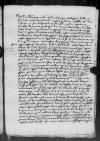List #4721
Tiedemann GIESE do Ioannes DANTISCUSFrauenburg (Frombork), 1537-07-26
| odebrano [1537]-07-28 Rękopiśmienne podstawy źródłowe:
Pomocnicze podstawy źródłowe:
| ||||||
Tekst + aparat krytyczny + komentarz Zwykły tekst Tekst + komentarz Tekst + aparat krytyczny
 AWWO, AB, D. 2, f. 47v
AWWO, AB, D. 2, f. 47v Reverendissimo in Christo Patri et Domino, domino
Reverendissime in Christo Pater et Domine, domine mihi semper colendissime, salutem et servitiorum meorum commendationem.
Recte et prudenter, ni fallor, Reverendissima Dominatio Vestra instruxit ea, quae ad legationem venerabilis
Videtur et in hoc falli Reverendissima Dominatio Vestra, quod existimat reverso nuntio et accepto responso posse statim ad postulationem procedi etiam ante diem praefixum, ad quem demum regius nuntius exspectandus sit, si postulatio non processerit. Ita enim videtur res a Reverendissima Dominatione Vestra instituta. Sed certum est nihil horum recte posse ante diem citationis confici et omnia illo referenda esse. Ideo prospiciat Reverendissima Dominatio Vestra, ne quis error hic incidat, serius adventante nuntio, quam ferat negotium, huncque tutius est nostro(?) verbo quam scripto nominatos proferre, quo liceat ex re moderari consilia.
Antea scripsi plurimum scrupuli in hoc residere apud plerosque, si absque nominationibus proce superinscribed⌈cece superinscribed⌉dendum fuerit ad postulationem, quod non contemnat Reverendissima Dominatio Vestra. Ego in hoc sum sum assidue, ut hanc diluam superstitiosam vacillationem. Alioqui non est, quod Reverendissima Dominatio Vestra hic dubitet aut diffidat de his, qui re ipsa declaraverunt sua studia erga ipsam. Domini
Dixeram hic cuidam amico in secretam aurem querens omnes prope consiliarios se subduxisse ex proximo conventu Thorunensi et articulum de indigenae interpretatione prorsus neglectui habitum fuisse, nisi nos, qui relicti eramus, praestitissemus operam  AWWO, AB, D. 2, f. 46v nostram, significans videlicet Reverendissimam Dominationem Vestram in primis, deinde me collegamque meum text damaged⌈[um]um text damaged⌉. Hanc rem ille subolfactam, ut est in talibus sagacissimus, in quam ementiciam hidden by binding⌈[iciam]iciam hidden by binding⌉ calumniam traxerit, non sine stomacho audire potui. Ac utinam liceret mihi per Dominationem Vestram Reverendissimam digerere hanc meam iustam indignationem ac palam detegere illius prodigiosa mendacia ac cor livore et virulentia turgens hidden by binding⌈[s]s hidden by binding⌉. Sed arbitror Reverendissimam Dominationem Vestram agnoscere artificium hominis, qui ut ulciscatur cassas affectiones suas et conscientiam non optimae de se opinionis, hoc maxime conatur, ut nobis, quorum studiis iuvari videtur Dominatio Vestra Reverendissima, fidem apud eam adimat, quominus sint Vestrae quoque Reverendissimae Dominationis res firmae. Sed quid aliud facit, quam quod prodit se ipsam turgens invidia, cuius ingenii est, talibus argumentis ad persuadendum uti, quibus efficit, ut nihil sibi credatur.
AWWO, AB, D. 2, f. 46v nostram, significans videlicet Reverendissimam Dominationem Vestram in primis, deinde me collegamque meum text damaged⌈[um]um text damaged⌉. Hanc rem ille subolfactam, ut est in talibus sagacissimus, in quam ementiciam hidden by binding⌈[iciam]iciam hidden by binding⌉ calumniam traxerit, non sine stomacho audire potui. Ac utinam liceret mihi per Dominationem Vestram Reverendissimam digerere hanc meam iustam indignationem ac palam detegere illius prodigiosa mendacia ac cor livore et virulentia turgens hidden by binding⌈[s]s hidden by binding⌉. Sed arbitror Reverendissimam Dominationem Vestram agnoscere artificium hominis, qui ut ulciscatur cassas affectiones suas et conscientiam non optimae de se opinionis, hoc maxime conatur, ut nobis, quorum studiis iuvari videtur Dominatio Vestra Reverendissima, fidem apud eam adimat, quominus sint Vestrae quoque Reverendissimae Dominationis res firmae. Sed quid aliud facit, quam quod prodit se ipsam turgens invidia, cuius ingenii est, talibus argumentis ad persuadendum uti, quibus efficit, ut nihil sibi credatur.
Dominatio Vestra Reverendissima, veniam, rogo, det stomacho meo, quo apud illam fortasse plus hidden by binding⌈[us]us hidden by binding⌉, quam decet, efferar. Dabit Dominus Deus tempus, quo de his licentius liceat scribere hidden by binding⌈[cribere]cribere hidden by binding⌉. Quod Dominatio Vestra Reverendissima de canonicatu suo d in dominum
Haec puto Reverendissimam Dominationem Vestram citra metum indignati[ae] hidden by binding⌈[ae hidden by binding⌈[ae]ae hidden by binding⌉][ae] hidden by binding⌉ ac honeste afferre in excusationem posse, quibus ne ipse quoque
Canonicatus ille per promotionem vel translationem Reverendissimae Dominationis Vestrae vacaturus est apud sedem, nec cadit supersub overwritten⌈subsub overwritten⌉ reservatione ... hidden by binding⌈[... illegible⌈...... illegible⌉]... hidden by binding⌉ illius nominationis, quam habet doctor  AWWO, AB, D. 2, f. 47r Post celebratam postulationem datis commendaticiis a
AWWO, AB, D. 2, f. 47r Post celebratam postulationem datis commendaticiis a
Ex litteris Reverendissimae Dominationis Vestrae nihil intellego, numquid apud reverendissimum
Tota mea spes est ex Dominatione Vestra Reverendissima et mea ipsius conscientia, quae est mihi portus tutissimus. Obsecro, Reverendissima Dominatio Vestra persuadeat sibi de me omnia, quae vel optare posset ab homine fidissimo ac integerrimo servitore. Res ipsa docebit eam non in calcitrosum, ut ille ait, iumentum alendum, sed in famulum obsequentem atque addictissimum sibi devinciendum minime paenitendam collocasse operam.
Valeat felicissime ipsa Reverendissima Dominatio Vestra, cui cupio esse commendatissimus.
Dat(ae) or Dat(um)⌈Dat(ae)Dat(ae) or Dat(um)⌉
Postscript:
Litteras regias omnes cum instructione remitto praesentibus.
Eiusdem Reverendissimae Dominationis Vestrae obsequentissimus servitor,



